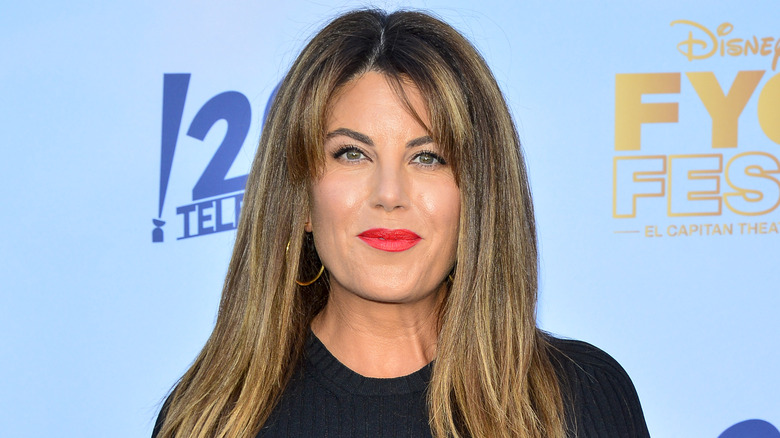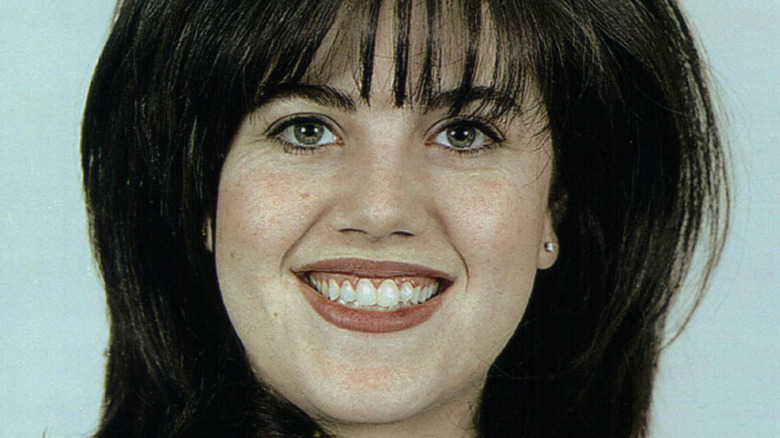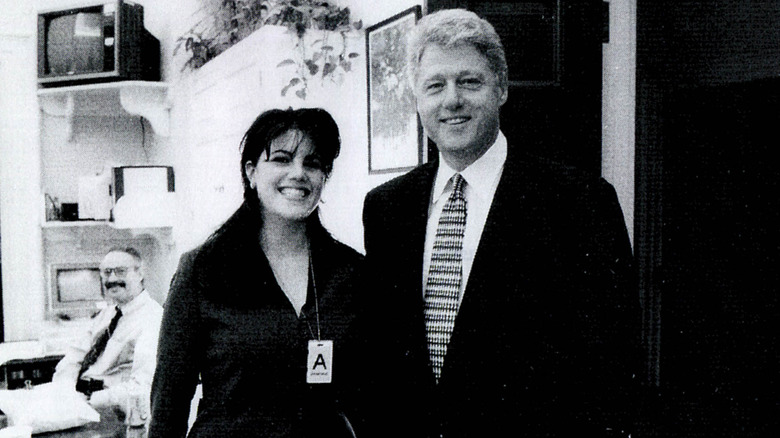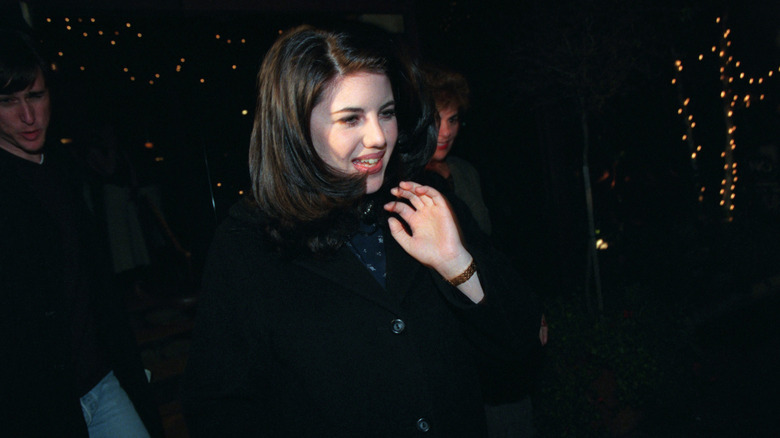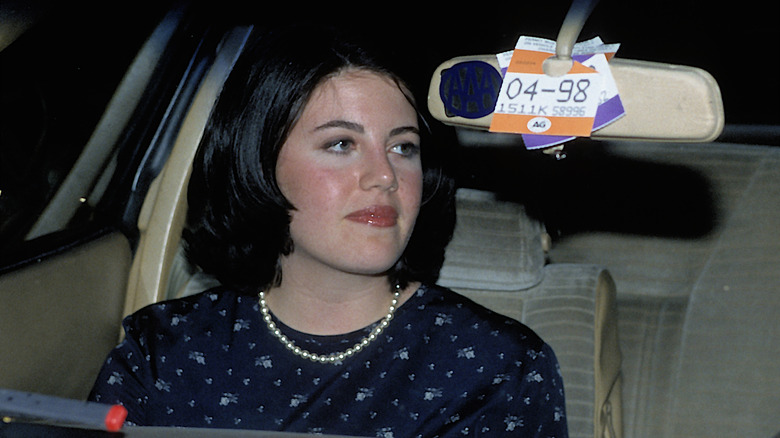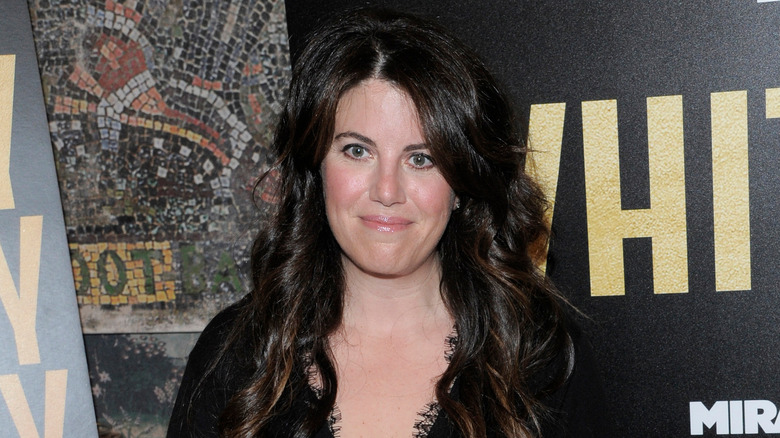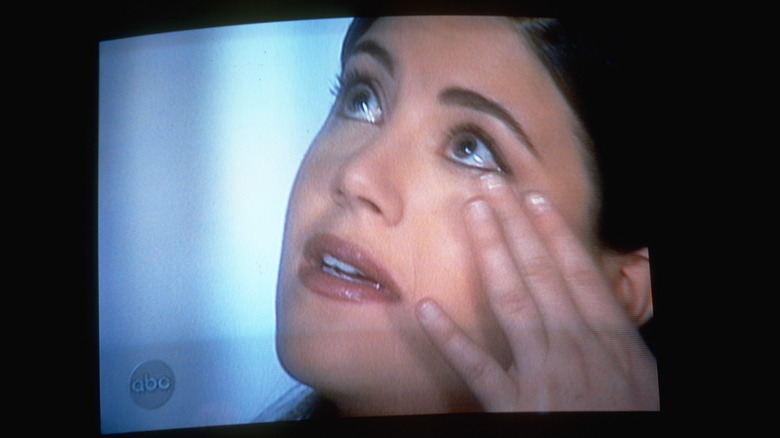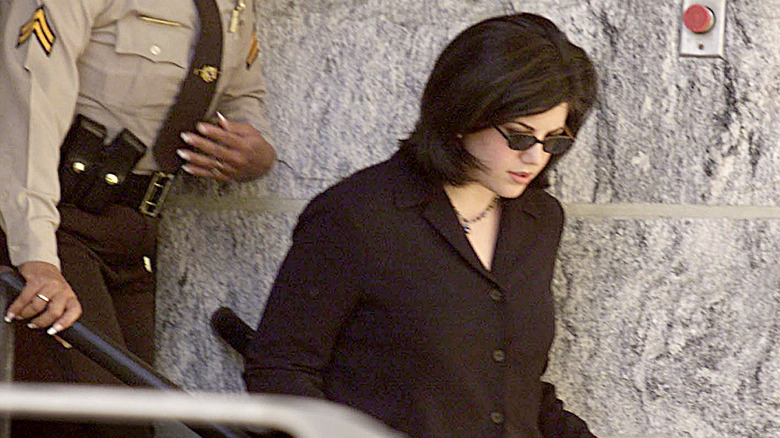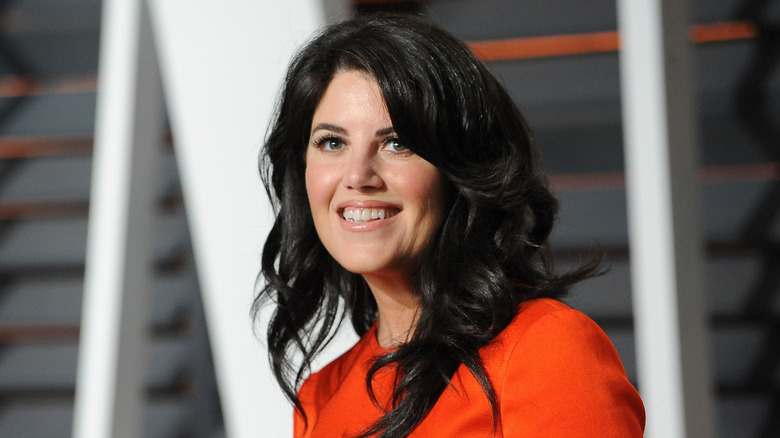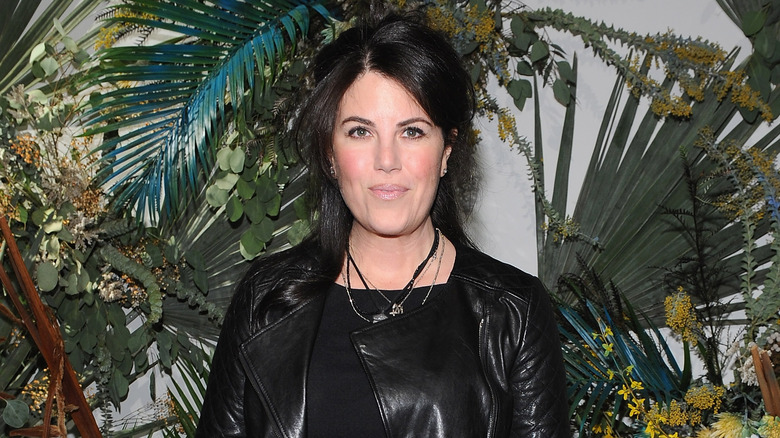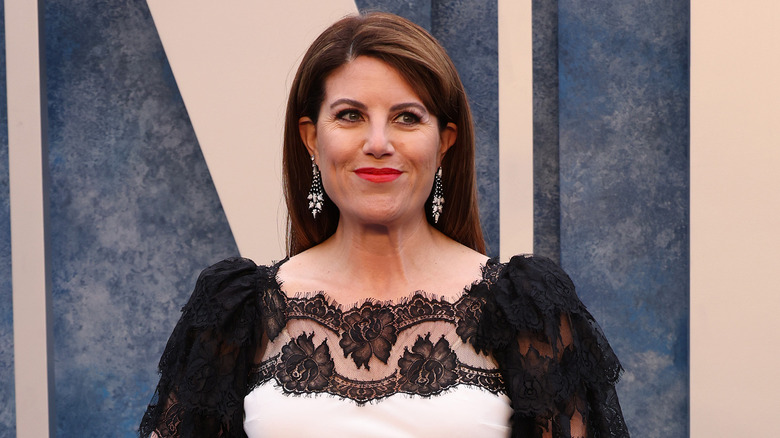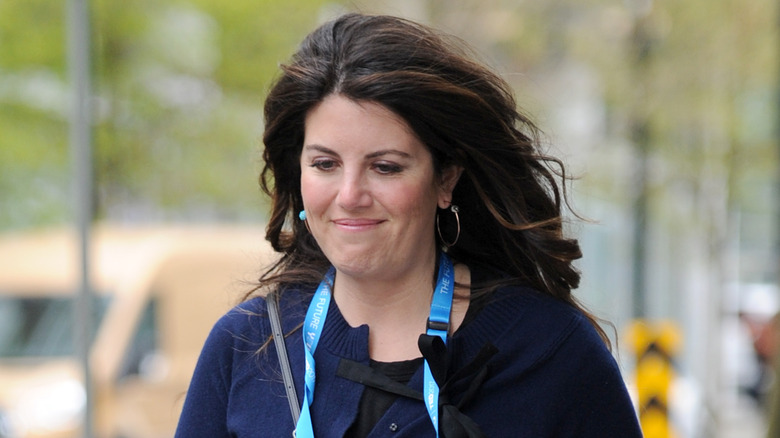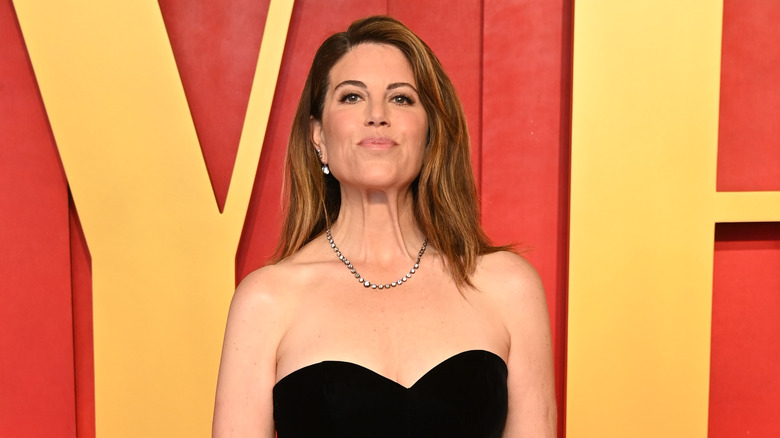The Tragic Truth Of Monica Lewinsky
The following article includes mention of mental health issues and suicide.
As the White House intern who nearly brought down Bill Clinton's presidency, Monica Lewinsky's name has been cloaked in infamy for nearly three decades. When news broke of her affair with the man who was then the leader of the free world, it kicked off a political firestorm unlike anything before or since. There were so many facets of that story that, in retrospect, it's enough to make anybody's head spin: a "vast right-wing conspiracy" (as described by former First Lady Hilary Clinton) to impeach a sitting president; duplicitous faux friend Linda Tripp surreptitiously taping her and Lewinsky's private calls; and snickering jokes about cigars, to highlight just a few.
While Lewinsky was just 22 when she began her affair with the 49-year-old Clinton, she was depicted by the media as a scarlet woman — a "red-blooded predator," wrote New York Times columnist Maureen Dowd — yet the passage of years has revealed a far more nuanced reality. After decades of criticism, Lewinsky is widely considered a victim, a naïve young woman used as a pawn in a bitter power struggle between polarized political forces.
That long-ago scandal continues to loom large in her life, despite her continuing efforts to put it all behind her. Lewinsky has become a sympathetic and even tragic figure, whose life continues to be marred by something that happened three decades ago, in addition to her own personal hardships.
Monica Lewinsky never felt as if she fit in
Monica Lewinsky was brought up in Beverly Hills, in an atmosphere of privilege. Her father, oncologist Bernard Lewinsky, and her mother, Marcia Lewis, separated in 1987. At the time of the divorce, Monica was 13 or 14, an awkward young teenager struggling with her weight. When she was in high school, she gravitated toward the drama department. Laraine Dave, mother of a boy who whom she dated, told The Washington Post that Lewinsky didn't possess the "body type" for the leading roles she sought. "She had the face. She had the talent. She had everything," Dave recalled. "Her weight was an obstacle."
That Washington Post profile, in fact, painted Lewinsky as a lifelong outsider, someone who didn't fit in at school, nor at college, nor when she nabbed a Washington, D.C. internship. While her fellow interns were immersed in politics, looking to establish a foothold for an eventual career in D.C., Lewinsky showed little interest in the subject. "Monica was never a political person. She never discussed politics," a friend explained to the Post.
As Dave recalled, Lewinsky seemed to get along with people older than her far better than she did with her peers. While interning in the Pentagon, she began dating an older man. That tendency, to better relate to her elders rather than those her own age, would later be seen in her friendship with Linda Tripp, and her affair with Bill Clinton.
She later pondered whether Bill Clinton took advantage of her
While many sordid details of Monica Lewinsky's sexual relationship with former President of the United States Bill Clinton have become public knowledge, the years that have followed have brought about the #MeToo movement — and the uncomfortable realization that a seemingly consensual relationship becomes complicated when a power imbalance is involved. Discussing the affair in a 2014 essay for Vanity Fair, Lewinsky described her relationship with Clinton as a reciprocal one, while also not so cut-and-dry. "Sure, my boss took advantage of me, but I will always remain firm on this point: it was a consensual relationship," she wrote. "Any 'abuse' came in the aftermath."
In 2018, however, her perspective had shifted in light of the revelations exhumed by the numerous women who had come forward with their #MeToo stories. "Now, at 44, I'm beginning ... to consider the implications of the power differentials that were so vast between a president and a White House intern," she wrote in another Vanity Fair essay. "I'm beginning to entertain the notion that in such a circumstance the idea of consent might well be rendered moot. (Although power imbalances — and the ability to abuse them — do exist even when the sex has been consensual) But it's also complicated. Very, very complicated."
A year later, Lewinsky issued a statement to Vanity Fair, sharing similar concerns about power dynamics in general. "Powerful people, often men, take advantage of those subordinate to them in myriad ways all the time," she reflected.
The public scrutiny she faced was 'incredibly painful'
The world of the 2020s is very different from that of the 1990s. Back then, a person's physical appearance was fair game for mockery, without any repercussions or any stigma about that type of behavior being bullying. Few people have experienced that to the degree that Monica Lewinsky has, something she pointed out in a 2021 interview with People.
In that interview, Lewinsky described the embarrassing and extensive public scrutiny she experienced as a young woman caught in the middle of a national media firestorm. As she explained, what was then viewed as perfectly acceptable would seen as downright appalling today. "We didn't even have words like 'fat shaming' or 'slut shaming' then," Lewinsky explained. "It was incredibly painful."
That pain never really subsided and has continued to manifest itself in various ways many years later. "I still don't like having my photo taken professionally," she admitted. "Twenty-plus years on, there's still a mental tape that holds some of those traumatic experiences of hearing people say awful things, seeing cartoons of myself and this idea that the only reason an actual relationship [with Clinton] could have been possible was if I were more attractive," she added. "I already had self-esteem issues and being the object of ridicule didn't help."
The media skewed the situation against her
While Bill Clinton and special prosecutor Ken Starr both bore responsibility for the way Monica Lewinsky came to be perceived, the biggest culprit on that front was clearly the media. While hindsight has made it easy to see Lewinsky as a young woman who unwisely and naively had an affair with a powerful older man who should have known better, media portrayals during the height of the scandal painted Lewinsky as the primary wrongdoer.
The New York Historical Society's Women and the American Story detailed some specific instances of this, illustrating that the prevailing media narrative placed the blame for the affair squarely on Lewinsky's shoulders. That was evident in the Wall Street Journal's description of her as "a little tart," and The New York Times deeming her to be "a ditzy, predatory White House intern." Not surprisingly, that was the way she was viewed in a 1999 poll about the scandal, with respondents overwhelmingly placing more blame on her than Clinton. "The responses to the questions give an impression of her as a scheming home-wrecker without remorse for the affair," noted the article.
During the darkest days of the scandal, Lewinsky's mother feared that the negativity and pressure would lead to her harming herself. "The shame, the scorn, and the fear that had been thrown at her daughter left her afraid that I would take my own life — a fear that I would be literally humiliated to death," Lewinsky wrote in Vanity Fair.
She was the butt of comedians' jokes for years
While the media certainly had a field day reporting on Monica Lewinsky, that was nothing compared to the deep well of material she provided to late-night comedy shows on television. Arguably the worst offender was comedian Jay Leno, who frequently targeted Lewinsky in his "Tonight Show" monologues. According to a 2014 study undertaken by George Mason University's Center for Media and Public Affairs (via The Hollywood Reporter), Leno cracked more than 450 jokes about Lewinsky.
Some of Leno's contemporaries have apologized for their merciless mockery. During a 2014 episode of the "Late Show with David Letterman," the host was interviewing late TV news icon Barbara Walters, with the two discussing the essay Lewinsky had recently written for Vanity Fair. "And then I started to feel bad," Letterman said, as reported by Time. "Because myself and other people with shows like this made relentless jokes about the poor woman. And she was a kid, she was 21, 22 ... I feel bad about my role in helping push the humiliation to the point of suffocation."
Bill Maher was also affected by Lewinsky's Vanity Fair essay. "I was moved by it," Maher confessed during an episode of his HBO show, "Real Time with Bill Maher" (via Politico). "I gotta tell you, I literally felt guilty."
She was 'patient zero' of online cancellation
In a particularly unfortunate confluence, the scandal that was sparked by Monica Lewinsky's affair with Bill Clinton coincided with the rise of the internet. That combination of salacious tabloid reporting and burgeoning technology was evident in Matt Drudge's trailblazing site, the Drudge Report, which broke the story of the affair.
Discussing the scandal with The Guardian, Lewinsky described herself as "patient zero of losing my reputation online." "I went to bed one night a private person, and the next day I was known by the entire world. That couldn't have happened without the internet," she explained.
Lewinsky also pondered whether today's pervasive social media landscape would have exacerbated her situation back in the 1990s and admitted that it would likely have been something of a double-edged sword. While there would have certainly been an increased level of nastiness, Lewinsky pointed to the positive flip side of social media. "But it also would have provided support," she said, revealing that at the time, the only way she ever received any degree of support was when someone would write her a letter. "Sometimes the highlight of my day would literally be going to get the mail, which is pretty pathetic," she recalled.
She never shook the stigma of being 'that woman'
After the scandal broke, then-President Bill Clinton flat out denied that he had an affair with Monica Lewinsky. As he infamously — and, as it was later revealed, falsely – declared, "I did not have sexual relations with that woman."
That woman. Those two words have continued to evoke shame and pain for Lewinsky, something she opened up about in her acclaimed 2015 TED Talk about bullying. "I was branded as a tramp, tart, slut, whore, bimbo and, of course, 'that woman,'" she said, repeating Clinton's dismissive reference to her. As she explained, that phrase contributed to dehumanizing her, which may well have been why Clinton chose to use it. "I was known by many, but actually known by few," Lewinsky said. "I get it. It was easy to forget 'that woman' was dimensional and had a soul."
Having experienced it firsthand, and witnessing the phenomenon evolve in some ugly new ways thanks to the prevalence of social media, Lewinsky called for something she saw lacking in society: kindness. "Public humiliation as a blood sport has to stop," she said. "We need to return to a long-held value of compassion and empathy."
She had to overcome 'excruciating shame and pain'
Monica Lewinsky has truly been put through the wringer, yet has emerged as a stronger and more resilient person. As she told USA Today, the trauma that she experienced may not seem evident to others, but it's something that she continues to live with on a day-to-day basis. "It's not going to clear up like a blemish," she explained. "It's sort of something you have to find ways to live with."
While few people have gone through the kind of public humiliation at the level that she has, that also makes her something of an expert on how to overcome it. "This may feel emotionally like the worst moment and excruciating shame and pain, and you just want to curl into a ball and disappear, but it will change, and you will have joy again and you will feel yourself again," she added. "There's always going to be that piece of you."
As dark as things became for Lewinsky, and as hopeless as her situation may have seemed, Lewinsky was able to get through it. She managed to achieve that, she said in her 2015 TED Talk, by rising up and taking control of her own narrative. "Anyone who is suffering from shame and public humiliation needs to know one thing: you can survive it," she said. "I know it's hard. It may not be painless, quick or easy, but you can insist on a different ending to your story."
Her mental health took a toll after the scandal
It should hardly be surprising that Monica Lewinsky's mental health took a substantial hit due to the national firestorm. Being apprehended by FBI agents and threatened with serious jail time if she refused to testify against Clinton was just the beginning of what proved to be years of public humiliation on a scale rarely seen.
There was a point when Lewinsky seriously considered suicide as an option. "I just couldn't see a way out. And I thought that maybe that was the solution," she told CNN's David Axelrod on his "The Axe Files" podcast. Looking back on what took place, Lewinsky is shocked that there wasn't a mental health professional brought in to help her cope with the massive weight that had been dropped upon her. "How was there not a protocol?" she asked. "That's a point where you're supposed to bring a psychologist in or, you know, something."
According to Lewinsky, she really felt that she was at a point where her life hung in the balance. "I think a lot of people who have ever had suicidal ideations find themselves in a moment where it's just — it's a moment of grace, like, you know, two roads diverged in the woods," she added, sharing her gratitude that she wound up coming into contact with a forensic psychologist who helped her work through the feelings she was experiencing.
Self-loathing led Lewinsky to bully herself
As Monica Lewinsky has pointed out, she long struggled with self-esteem issues, dating back to her childhood. Receiving the interest of the President of the United States of America certainly helped bolster her self-confidence. When it all came crashing down, however, her already-fragile self-image was utterly crushed by the negativity that was immediately heaped upon her, in the most public way possible.
Given the tenuous state of her self-esteem, it's not surprising that the whole scandal led her to become even more critical of herself than she already had been. Lewinsky illuminated that in her 2015 TED Talk, explaining that each of us can be our own worst enemies by buying into the criticism.
Having been forced to confront that, Lewinsky shared the wisdom that she gained from what she went through in a 2023 essay for Today. "We'll never fully eradicate that negative voice in our heads, but we can shift it," she explained. "We can quiet it at times and even begin to see subtle changes in how we automatically talk to ourselves." As Lewinsky explained, the meanest, nastiest bully she ever encountered was herself, something she was trying to banish from her psyche. "I have worked tirelessly on my silent bully and yet my friends would probably tell you I'm still not as kind about myself as I could be," she confessed.
Lewinsky was never able to have the career she envisioned
When Monica Lewinsky won a coveted internship in the White House, she saw that as a building block in the brilliant future career she was chasing for herself. Sadly, the Bill Clinton sex scandal derailed those plans. As Lewinsky shared in an interview with The New York Times, she never set out to become one of the most notorious people in the world, she simply desired what everyone else did. "I wanted a job, I wanted a husband, I wanted kids," she said. "I wanted to be treated normally."
Unfortunately, normalcy is something that has been completely alien to Lewinsky for decades. She has certainly tried, however, even fleeing to London in an attempt to get a graduate degree and embark on the life she had always envisioned for herself. As she quickly discovered, the scandal was so huge that there was nowhere she could go to escape it, not even London.
"In the first few years after the scandal, I ran away and went to graduate school and thought, I'll go to another country and get a master's degree and get a job," she recalled in an interview with People. She dreamed of a day when the public would lose interest in her, and she could return to living a boring, normal live. "I'm going to get married and have kids and everyone will forget THAT Monica Lewinsky," she said. "But that didn't work."
It felt 'terrifying' to step back into the public eye
At a certain point, Monica Lewinsky realized that retreating from the spotlight and attempting to live a so-called normal life beyond the harsh glare of the media simply wasn't an option. Instead, she decided to lean into her notoriety and work to change the narrative by telling her story, her way, in hopes of countering decades of negative media reporting about her. Besides writing several essays chronicling her true thoughts, feelings, and analysis, she served as a producer on the Ryan Murphy-made "Impeachment: American Crime Story" about the affair and subsequent impeachment.
While it's fair to say that her efforts have been unequivocally successful, she understandably had some serious trepidation. Appearing on NBC's "Today" (via People) in 2023, Lewinsky recalled the intense fear she felt when confronted with the possibility of returning to the spotlight she had been fleeing for decades. "It was terrifying," Lewinsky told interviewer Savannah Guthrie. "I mean, and I find doing this [interview] hard. It's not natural to me. But it was a long journey from '98. It's been 25 years now. And I'm grateful, I'm really grateful for where things are now."
If you or anyone you know needs help with mental health issues, or is in crisis, contact the relevant resources below:
- Contact the Crisis Text Line by texting HOME to 741741, call the National Alliance on Mental Illness helpline at 1-800-950-NAMI (6264), or visit the National Institute of Mental Health website.
- Call or text 988 or chat 988lifeline.org.

